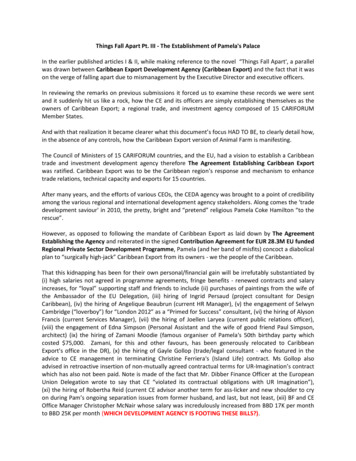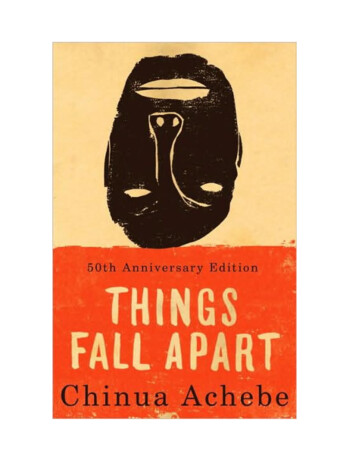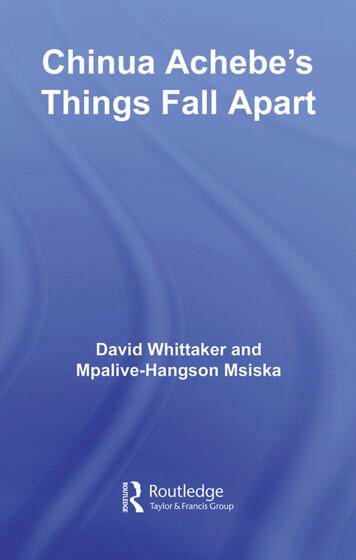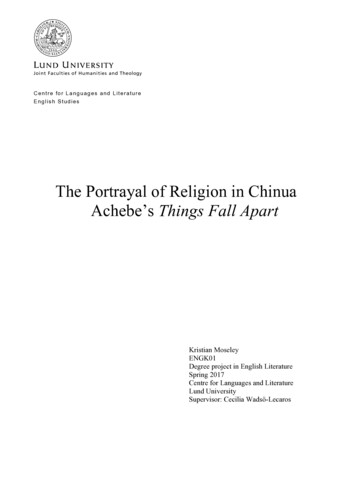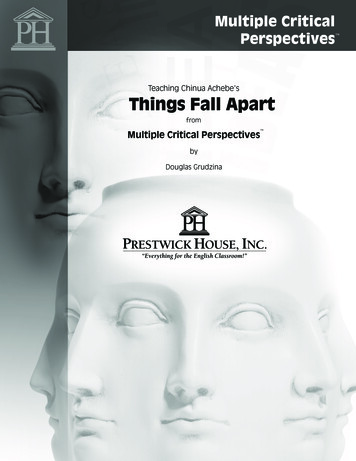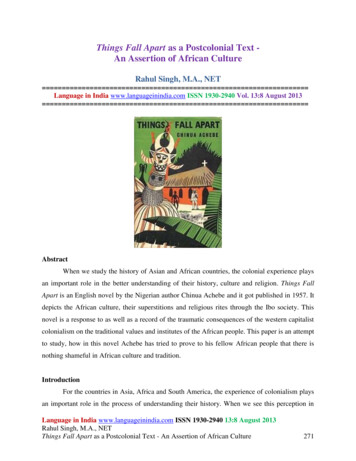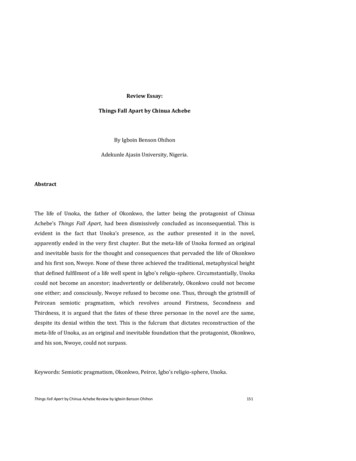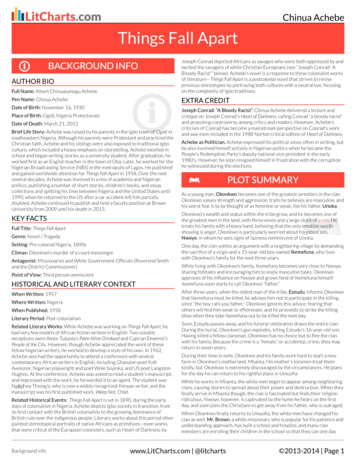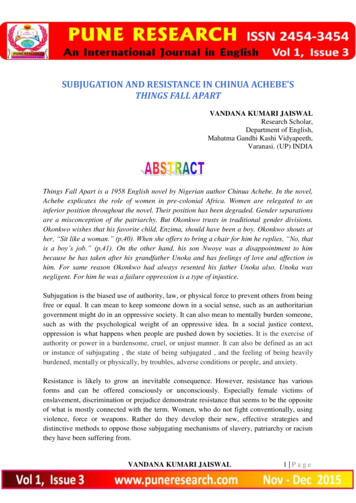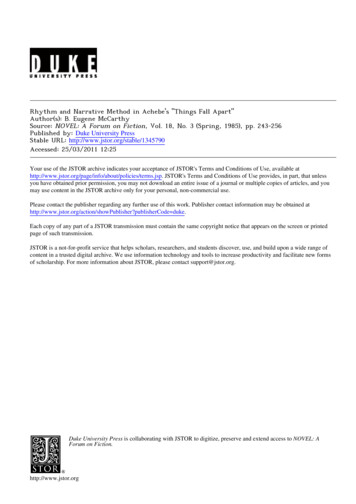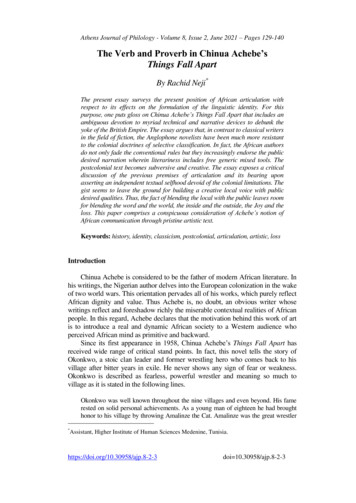
Transcription
THINGS F ALL APART1
ALSO BY CHINUA ACHEBEFictionAnthills of the SavannahArrow of GodGirls at War and Other StoriesA Man of the PeopleNo Longer at EaseNonfictionHopes and Impediments: Selected EssaysThe Trouble With NigeriaPoetryBeware Soul Brother2
THINGSFALLAPARTCHINUAACHEBEANCHOR BOOKSDOUBLEDAYNew York London Toronto Sydney Auckland3
AN ANCHOR BOOKPUBLISHED BY DOUBLEDAYa division of Bantam Doubleday Dell Publishing Group, Inc.1540 Broadway, New York, New York 10036ANCHOR BOOKS, DOUBLEDAY, and the portrayal of an anchorare trademarks of Doubleday, a division ofBantam Doubleday Dell- Publishing Group, Inc.This Anchor Books edition is published by arrangement with ReedConsumer Books. The author and publisher gratefully acknowledgepermission from Aigboje Higo and Heinemann Educational Books,Ltd., to reproduce the Glossary on page 211,Book design by Susan YuranLibrary of Congress Cataloging-in -Publication DataAchebe, Chinua.Things fall apart / by Chinua Achebe. - Ist Anchor Books ed.p. cm.1. Nigeria-Race relations-Fiction. 2. Igbo (African people)Fiction. 3. Men-Nigeria-Fiction. 1. Title.PR9387.9.A3T5 1994823-dc2O94-13429CIPISBN 0-385-47454-7Copyright @ 1959 by Chinua AchebeAll rights reserved under International and Pan-American CopyrightConventions, including the right to reproduce this book or portionsthereof in any form.Printed in the United States of AmericaFirst Anchor Books Edition; October 199410 9 8 7 6 5 4 3 24
Turning and turning in the widening gyreThe falcon cannot hear the falconerThings fall apart the center cannot hold;Mere anarchy is loosed upon the world.-W. B. Yeats, "The Second Coming"5
6
THINGS F ALL APART7
8
PART ONE1
2
CHAPTER ONEOkonkwo was well known throughout the nine villages and evenbeyond. His fame rested on solid personal achievements. As a youngman of eighteen he had brought honor to his village by throwingAmalinze the Cat. Amalinze was the great wrestler who for sevenyears was unbeaten, from Umuofia to Mbaino. He was called the Catbecause his back would never touch the earth. It was this man thatOkonkwo threw in a fight which the old men agreed was one of thefiercest since the founder of their town engaged a spirit of the wildfor seven days and seven nights.The drums beat and the flutes sang and the spectators held theirbreath. Amalinze was a wily craftsman, but Okonkwo was as slipperyas a fish in water. Every nerve and every muscle stood out on theirarms, on their backs and their thighs, and one almost heard themstretching to breaking point. In the end Okonkwo threw the Cat.That was many years ago, twenty years or more, and during thistime Okonkwo's fame had grown like a bush-fire in the harmattan.He was tall and huge, and his bushy eyebrows3
and wide nose gave him a very severe look. He breathed heavily, andit was said that, when he slept, his wives and children in their housescould hear him breathe. When he walked, his heels hardly touchedthe ground and he seemed to walk on springs, as if he was going topounce on somebody. And he did pounce on people quite often. Hehad a slight stammer and whenever he was angry and could not gethis words out quickly enough, he would use his fists. He had nopatience with unsuccessful men. He had had no patience with hisfather.Unoka, for that was his father's name, had died ten years ago. Inhis day he was lazy and improvident and was quite incapable ofthinking about tomorrow. If any money came his way, and it seldomdid, he immediately bought gourds of palm-wine, called round hisneighbors and made merry. He always said that whenever he saw adead man's mouth he saw the folly of not eating what one had inone's lifetime. Unoka was, of course, a debtor, and he owed everyneighbor some money, from a few cowries to quite substantialamounts.He was tall but very thin and had a slight stoop. He wore ahaggard and mournful look except when he was drinking or playingon his flute. He was very good on his flute, and his happiest momentswere the two or three moons after the harvest when the villagemusicians brought down their instruments, hung above the fireplace.Unoka would play with them, his face beaming with blessedness andpeace. Sometimes another village would ask Unoka's band and theirdancing egwugwu to come and stay with them and teach them theirtunes. They would go to such hosts for as long as three or four4
markets, making music and feasting. Unoka loved the good fare andthe good fellowship, and he loved this season of the year, when therains had stopped and the sun rose every morning with dazzlingbeauty. And it was not too hot either, because the cold and dryharmattan wind was blowing down from the north. Some years theharmattan was very severe and a dense haze hung on the atmosphere.Old men and children would then sit round log fires, warming theirbodies. Unoka loved it all, and he loved the first kites that returnedwith the dry season, and the children who sang songs of welcome tothem. He would remember his own childhood, how he had oftenwandered around looking for a kite sailing leisurely against the bluesky. As soon as he found one he would sing with his whole being,welcoming it back from its long, long journey, and asking it if it hadbrought home any lengths of cloth.That was years ago, when he was young. Unoka, the grown-up,was a failure. He was poor and his wife and children had barelyenough to eat. People laughed at him because he was a loafer, andthey swore never to lend him any more money because he never paidback. But Unoka was such a man that he always succeeded inborrowing more, and piling up his debts.One day a neighbor called Okoye came in to see him. He wasreclining on a mud bed in his hut playing on the flute. Heimmediately rose and shook hands with Okoye, who then unrolledthe goatskin which he carried under his arm, and sat down. Unokawent into an inner room and soon returned with5
a small wooden disc containing a kola nut, some alligator pepper anda lump of white chalk."I have kola," he announced when he sat down, and passed thedisc over to his guest."Thank you. He who brings kola brings life. But I think youought to break it," replied Okoye, passing back the disc."No, it is for you, I think," and they argued like this for a fewmoments before Unoka accepted the honor of breaking the kola.Okoye, meanwhile, took the lump of chalk, drew some lines on thefloor, and then painted his big toe.As he broke the kola, Unoka prayed to their ancestors for life andhealth, and for protection against their enemies. When they had eatenthey talked about many things: about the heavy rains which weredrowning the yams, about the next ancestral feast and about theimpending war with the village of Mbaino. Unoka was never happywhen it came to wars. He was in fact a coward and could not bear thesight of blood. And so he changed the subject and talked aboutmusic, and his face beamed. He could hear in his mind's ear theblood-stirring and intricate rhythms of the ekwe and the udu and theogene, and he could hear his own flute weaving in and out of them,decorating them with a colorful and plaintive tune. The total effectwas gay and brisk, but if one picked out the flute as it went up anddown and then broke up into short snatches, one saw that there wassorrow and grief there.Okoye was also a musician. He played on the ogene. But he wasnot a failure like Unoka. He had a large barn full of yams and he hadthree wives. And now he was going to take the Idemili title, the thirdhighest in the land. It was a very6
expensive ceremony and he was gathering all his resources together.That was in fact the reason why he had come to see Unoka. Hecleared his throat and began:"Thank you for the kola. You may have heard of the title I intendto take shortly."Having spoken plainly so far, Okoye said the next half a dozensentences in proverbs. Among the lbo the art of conversation isregarded very highly, and proverbs are the palmoil with which wordsare eaten. Okoye was a great talker and he spoke for a long time,skirting round the subject and then hitting it finally. In short, he wasasking Unoka to return the two hundred cowries he had borrowedfrom him more than two years before. As soon as Unoka understoodwhat his friend was driving at, he burst out laughing. He laughedloud and long and his voice rang out clear as the ogene, and tearsstood in his eyes. His visitor was amazed, and sat speechless. At theend, Unoka was able to give an answer between fresh outbursts ofmirth."Look at that wall," he said, pointing at the far wall of his hut,which was rubbed with red earth so that it shone. "Look at those linesof chalk;" and Okoye saw groups of short perpendicular lines drawnin chalk. There were five groups, and the smallest group had tenlines. Unoka had a sense of the dramatic and so he allowed a pause,in which he took a pinch of snuff and sneezed noisily, and then hecontinued: "Each group there represents a debt to someone, and eachstroke is one hundred cowries. You see, I owe that man a thousandcowries. But he has not come to wake me up in the morning for it. Ishall pay you, but not today. Our elders say that the7
sun will shine on those who stand before it shines on those who kneelunder them. I shall pay my big debts first," And he took anotherpinch of snuff, as if that was paying the big debts first. Okoye rolledhis goatskin and departed.When Unoka died he had taken no title at all and he was heavilyin debt. Any wonder then that his son Okonkwo was ashamed ofhim? Fortunately, among these people a man was judged accordingto his worth and not according to the worth of his father. Okonkwowas clearly cut out for great things. He was still young but he hadwon fame as the greatest wrestler in the nine villages. He was awealthy farmer and had two barns full of yams, and had just marriedhis third wife. To crown it all he had taken two titles and had shownincredible prowess in two inter-tribal wars. And so althoughOkonkwo was still young, he was already one of the greatest men ofhis time. Age was respected among his people, but achievement wasrevered. As the elders said, if a child washed his hands he could eatwith kings. Okonkwo had clearly washed his hands and so he atewith kings and elders. And that was how he came to look after thedoomed lad who was sacrificed to the village of Umuofia by theirneighbors to avoid war and bloodshed. The ill-fated lad was calledIkernefuna.8
CHAPTER T WOOkonkwo had just blown out the palm-oil lamp and stretched himselfon his bamboo bed when he heard the o9ene of the town crierpiercing the still night air. Gome, gome, gome, gome, boomed thehollow metal. Then the crier gave his message, and at the end of itbeat his instrument again. And this was the message. Every man ofUmuofia was asked to 'gather at the market place tomorrow morning.Okonkwo wondered what was- amiss, for he knew certainly thatsomething was amiss. He had discerned a clear overtone of tragedy inthe crier's voice, and even now he could still hear it as it grewdimmer and dimmer in the distance.The night was very quiet. It was always quiet except onmoonlight nights. Darkness held a vague terror for these people, eventhe bravest among them. Children were warned not to whistle at nightfor fear of evil spirits. Dangerous animals became even more sinisterand uncanny in the dark. A snake was never called by its name atnight, because it would hear. It was called a string. And so on thisparticular night as the crier's voice was gradually swallowed up in thedistance, silence9
returned to the world, a vibrant silence made more intense by theuniversal trill of a million million forest insects.On a moonlight night it would be different. The happy voices ofchildren playing in open fields would then be heard. And perhapsthose not so young would be playing in pairs in less open places, andold men and women would remember their youth. As the lbo say:"When the moon is shining the cripple becomes hungry for a walk."But this particular night was dark and silent. And in all the ninevillages of Umuofia a town crier with his ogene asked every man tobe present tomorrow morning. Okonkwo on his bamboo bed tried tofigure out the nature of the emergency war with a neighboring clan?That seemed the most likely reason, and he was not afraid of war. Hewas a man of action, a man of war. Unlike his father he could standthe look of blood. In Umuofia's latest war he was the first to bringhome a human head. That was his fifth head; and he was not an oldman yet. On great occasions such as the funeral of a village celebrityhe drank his palm-wine from his first human head.In the morning the market place was full. There must have beenabout ten thousand men there, all talking in low voices. At lastOgbuefi Ezeugo stood up in the midst of them and bellowed fourtimes, "Umuofla kwenu," and on each occasion he faced a differentdirection and seemed to push the air with a clenched fist. And tenthousand men answered "Yaw" each time. Then there was perfectsilence. Ogbuefi Ezeugo was a powerful orator and was alwayschosen to speak on such occasions. He moved his hand over hiswhite head and stroked his white beard. He then adjusted his cloth,which10
was passed under his right arm-pit and tied above his left shoulder."Umuofla kwenu," he bellowed a fifth time, and the crowd yelledin answer. And then suddenly like one possessed he shot out his lefthand and pointed in the direction of Mbaino, and said throughgleaming white teeth firmly clenched: "Those sons of wild animalshave dared to murder a daughter of Umuofia." He threw his headdown and gnashed his teeth, and allowed a murmur of suppressedanger to sweep the crowd. When he began again, the anger on hisface was gone and in its place a sort of smile hovered, more terribleand more sinister than the anger. And in a clear unemotional voice hetold Umuofia how their daughter had gone to market at Mbaino andhad been killed. That woman, said Ezeugo, was the wife of OgbuefiUdo, and he pointed to a man who sat near him with a bowed head.The crowd then shouted with anger and thirst for blood.Many others spoke, and at the end it was decided to follow thenormal course of action. An ultimatum was immediately dispatchedto Mbaino asking them to choose between war on the one hand, andon the other the offer of a young man and a virgin as compensation.Umuofia was feared by all its neighbors. It was powerful in warand in magic, and its priests and medicine men were feared in all thesurrounding country. Its most potent war medicine was as old as theclan itself. Nobody knew how old. But on one point there wasgeneral agreement-the active principle in that medicine had been anold woman with one leg. In fact, the medicine itself was calledagadi-nwayi, or old11
woman. It had its shrine in the centre of Umuofia, in a cleared spot.And if anybody was so foolhardy as to pass by the shrine after duskhe was sure to see the old woman hopping about.And so the neighboring clans who naturally knew of these thingsfeared Umuofia, and would not go to war against it without firsttrying a peaceful settlement. And in fairness to Umuofia it should berecorded that it never went to war unless its case was clear and justand was accepted as such by its Oracle-the Oracle of the Hills and theCaves, and there were indeed occasions when the Oracle hadforbidden Umuofia to wage a war. If the clan had disobeyed theOracle they would surely have been beaten, because their dreadedagadi-nwayi would never fight what the lbo call a fl9bt of blame.But the war that now threatened was a just war. Even the enemyclan knew that. And so when Okonkwo of Umuofia arrived atMbaino as the proud and imperious emissary of war, he was treatedwith great honor and respect, and two days later he returned homewith a lad of fifteen and a young virgin. The lad’s name wasIkernefuna, whose sad story is still told in Umuofia unto this day.The elders, or ndicbie, met to hear a report of Okonkwo'smission. At the end they decided, as everybody knew they would,that the girl should go to Ogbuefi Udo to replace his murdered wife.As for the boy, he belonged to the clan as a whole, and there was nohurry to decide his fate. Okonkwo was, therefore, asked on behalf ofthe clan to look after him in the interim. And so for three yearsIkernefuna lived in Okonkwo's household.12
Okonkwo ruled his household with a heavy hand. His wives,especially the youngest, lived in perpetual fear of his fiery temper,and so did his little children. Perhaps down in his heart Okonkwowas not a cruet man. But his whole life was dominated by fear, thefear of failure and of weakness. It was deeper and more intimate thanthe fear of evil and capricious gods and of magic, the fear of theforest, and of the forces of nature, malevolent, red in tooth and claw.Okonkwo's fear was greater than these. It was not external but laydeep within himself. It was the fear of himself, lest he should befound to resemble his father. Even as a little boy he had resented hisfather's failure and weakness, and even now he still remembered howhe had suffered when a playmate had told him that his father wasagbala. That was how Okonkwo first came to know that agbala wasnot only another name for a woman, it could also mean a man whohad taken no title. And so Okonkwo was ruled by one passion-to hateeverything that his father Unoka had loved. One of those things wasgentleness and another was idleness.During the planting season Okonkwo worked daily on his farmsfrom cock-crow until the chickens went to roost. He was a verystrong man and rarely felt fatigue. But his wives and young childrenwere not as strong, and so they suffered. But they dared not complainopenly. Okonkwo's first son, Nwoye, was then twelve years old butwas already causing his father great anxiety for his incipient laziness.At any rate, that was how it looked to his father, and he sought tocorrect him by13
constant nagging and beating. And so Nwoye was developing into asad-faced youth.Okonkwo's prosperity was visible in his household. He had alarge compound enclosed by a thick wall of red earth. His own hut,or obi, stood immediately behind the only gate in the red walls. Eachof his three wives had her own hut, which together formed a halfmoon behind the obi. The barn was built against one end of the redwalls, and long stacks of yam stood out prosperously in it. At theopposite end of the compound was a shed for the goats, and eachwife built a small attachment to her hut for the hens. Near the barnwas a small house, the "medicine house" or shrine where Okonkwokept the wooden symbols of his personal god and of his ancestralspirits. He worshipped them with sacrifices of kola nut, food andpalm-wine, and offered prayers to them on behalf of himself, histhree wives and eight children.So when the daughter of Umuofia was killed in Mbaino,lkemefuna came into Okonkwo's household. When Okonkwobrought him home that day he called his most senior wife and handedhim over to her."He belongs to the clan," he told her. "So look after him.""Is he staying long with us?" she asked."Do what you are told, woman," Okonkwo thundered, andstammered. "When did you become one of the ndicbie of Umuofia?"And so Nwoye's mother took Ikernefuna to her hut and asked nomore questions.14
As for the boy himself, he was terribly afraid. He could notunderstand what was happening to him or what he had done. Howcould he know that his father had taken a hand in killing a daughterof Umuofia? All he knew was that a few men had arrived at theirhouse, conversing with his father in low tones, and at the end he hadbeen taken out and handed over to a stranger. His mother had weptbitterly, but he had been too surprised to weep. And so the strangerhad brought him, and a girl, a long, long way from home, throughlonely forest paths. He did not know who the girl was, and he neversaw her again.15
CHAPTER T HREEOkonkwo did not have the start in life which many young menusually had. He did not inherit a barn from his father. There was nobarn to inherit. The story was told in Umuofia, of how his father,Unoka, had gone to consult the Oracle of the Hills and the Caves tofind out why he always had a miserable harvest.The Oracle was called Agbala, and people came from far andnear to consult it. They came when misfortune dogged their steps orwhen they had a dispute with their neighbors. They came to discoverwhat the future held for them or to consult the spirits of theirdeparted fathers.The way into the shrine was a round hole at the side of a hill, justa little bigger than the round opening into a henhouse. Worshippersand those who came to seek knowledge from the god crawled ontheir belly through the hole and found themselves in a dark, endlessspace in the presence of Agbala. No one had ever beheld Agbala,except his priestess. But no one who had ever crawled into his awfulshrine had come out without the fear of his power. His priestess stoodby the sacred fire which she built in the heart of the16
cave and proclaimed the will of the god. The fire did not burn with aflame. The glowing logs only served to light up vaguely the darkfigure of the priestess.Sometimes a man came to consult the spirit of his dead father orrelative. It was said that when such a spirit appeared, the man saw itvaguely in the darkness, but never heard its voice. Some people evensaid that they had heard the spirits flying and flapping their wingsagainst the roof of the cave.Many years ago when Okonkwo was still a boy his father,Unoka, had gone to consult Agbala. The priestess in those days was awoman called Chika. She was full of the power of her god, and shewas greatly feared. Unoka stood before her and began his story."Every year," he said sadly, "before I put any crop in the earth, Isacrifice a cock to Ani, the owner of all land. It is the law of ourfathers. I also kill a cock at the shrine of Ifejioku, the god of yams. Iclear the bush and set fire to it when it is dry. I sow the yams whenthe first rain has fallen, and stake them when the young tendrilsappear. I weed-""Hold your peace!" screamed the priestess, her voice terrible as itechoed through the dark void. "You have offended neither the godsnor your fathers. And when a man is at peace with his gods and hisancestors, his harvest will be good or bad according to the strength ofhis arm. You, Unoka, are known in all the clan for the weakness ofyour machete and your hoe. When your neighbors go out with theirax to cut down virgin forests, you sow your yams on exhausted farmsthat take no labor to clear. They cross seven rivers to make17
their farms; you stay at home and offer sacrifices to a reluctant soil.Go home and work like a man."Unoka was an ill-fated man. He had a bad chi or personal god,and evil fortune followed him to the grave, or rather to his death, forhe had no grave. He died of the swelling which was an abominationto the earth goddess. When a man was afflicted with swelling in thestomach and the limbs he was not allowed to die in the house. Hewas carried to the Evil Forest and left there to die. There was thestory of a very stubborn man who staggered back to his house andhad to be carried again to the forest and tied to a tree. The sicknesswas an abomination to the earth, and so the victim could not beburied in her bowels. He died and rotted away above the earth, andwas not given the first or the second burial. Such was Unoka's fate.When they carried him away, he took with him his flute.With a father like Unoka, Okonkwo did not have the start in lifewhich many young men had. He neither inherited a barn nor a title,nor even a young wife. But in spite of these disadvantages, he hadbegun even in his father's lifetime to lay the foundations of aprosperous future. It was slow and painful. But he threw himself intoit like one possessed. And indeed he was possessed by the fear of hisfather's contemptible life and shameful death.There was a wealthy man in Okonkwo's village who had threehuge barns, nine wives and thirty children. His name was Nwakibieand he had taken the highest but one title18
which a man could take in the clan. It was for this man that Okonkwoworked to earn his first seed yams.He took a pot of palm-wine and a cock to Nwakibie. Two elderlyneighbors were sent for, and Nwakibie's two grown-up sons werealso present in his obi. He presented a kola nut and an alligatorpepper, which were passed round for all to see and then returned tohim. He broke the nut saying: "We shall all live. We pray for life,children, a good harvest and happiness. You will have what is goodfor you and I will have what is good for me. Let the kite perch and letthe eagle perch too. If one says no to the other, let his wing break."After the kola nut had been eaten Okonkwo brought hispalm-wine from the corner of the hut where it had been placed andstood it in the center of the group. He addressed Nwakibie, callinghim "Our father.""Nna ayi, " he said. "I have brought you this little kola. As ourpeople say, a man who pays respect to the great paves the way for hisown greatness. I have come to pay you my respects and also to ask afavor. But let us drink the wine first."Everybody thanked Okonkwo and the neighbors brought outtheir drinking horns from the goatskin bags they carried. Nwakibiebrought down his own horn, which was fastened to the rafters. Theyounger of his sons, who was also the youngest man in the group,moved to the center, raised the pot on his left knee and began to pourout the wine. The first cup went to Okonkwo, who must taste hiswine before anyone else. Then the group drank, beginning with theeldest man. When everyone had drunk two or three horns, Nwakibie19
sent for his wives. Some of them were not at home and only fourcame in."Is Anasi not in?" he asked them. They said she was coming.Anasi was the first wife and the others could not drink before her,and so they stood waiting.Anasi was a middle-aged woman, tall and strongly built, therewas authority in her bearing and she looked every inch the ruler ofthe womenfolk in a large and prosperous family. She wore the ankletof her husband's titles, which the first wife alone could wear.She walked up to her husband and accepted the horn from him.She then went down on one knee, drank a little and handed back thehorn. She rose, called him by his name and went back to her hut. Theother wives drank in the same way, in their proper order, and wentaway.The men then continued their drinking and talking. Ogbuefi Idigowas talking about the palm-wine tapper, Obiako, who suddenly gaveup his trade."There must be something behind it," he said, wiping the foam ofwine from his mustache with the back of his left hand. "There mustbe a reason for it. A toad does not run in the daytime for nothing.""Some people say the Oracle warned him that he would fall off apalm tree and kill himself," said Akukalia."Obiako has always been a strange one," said Nwakibie. I haveheard that many years ago, when his father had not been dead verylong, he had gone to consult the Oracle. The Oracle said to him,'Your dead father wants you to sacrifice a goat to him! Do you knowwhat he told the Oracle? He said,20
'Ask my dead father if he ever had a fowl when he was alive.'"Everybody laughed heartily except Okonkwo, who laughed uneasilybecause, as the saying goes, an old woman is always uneasy whendry bones are mentioned in a proverb. Okonkwo remembered hisown father.At last the young man who was pouring out the wine held up halfa horn of the thick, white dregs and said, "What we are eating isfinished." "We have seen it," the others replied. "Who will drink thedregs?" he asked. "Whoever has a job in hand," said Idigo, looking atNwakibie's elder son lgwelo with a malicious twinkle in his eye.Everybody agreed that lgwelo should drink the dregs. Heaccepted the half-full horn from his brother and drank it. As Idigohad said, Igwelo had a job in hand because he had married his firstwife a month or two before. The thick dregs of palm-wine weresupposed to be good for men who were going in to their wives.After the wine had been drunk Okonkwo laid his difficultiesbefore Nwakibie."I have come to you for help," he said. "Perhaps you can alreadyguess what it is. I have cleared a farm but have no yams to sow. Iknow what it is to ask a man to trust another with his yams,especially these days when young men are afraid of hard work. I amnot afraid of work. The lizard that jumped from the high iroko tree tothe ground said he would praise himself if no one else did. I began tofend for myself at an age when most people still suck at theirmothers' breasts. If you give me some yam seeds I shall not fail you."Nwakibie cleared his throat. "it pleases me to see a21
young man like you these days when our youth has gone so soft.Many young men have come to me to ask for yams but I have refusedbecause I knew they would just dump them in the earth and leavethem to be choked by weeds. When I say no to them they think I amhard hearted. But it is not so. Eneke the bird says that since men havelearned to shoot without missing, he has learned to fly withoutperching. I have learned to be stingy with my yams. But I can trustyou. I know it as I look at you. As our fathers said, you can tell a ripecorn by its took. I shall give you twice four hundred yams. Go aheadand prepare your farm."Okonkwo thanked him again and again and went home feelinghappy. He knew that Nwakibie would not refuse him, but he had notexpected he would be so generous. He had not hoped to get morethan four hundred seeds. He would now have to make a bigger farm.He hoped to get another four hundred yams from one of his father'sfriends at Isiuzo.Share-cropping was a very slow way of building up a barn ofone's own. After all the toil one only got a third of the harvest. Butfor a young man whose father had no yams, there was no other way.And what made it worse
revered. As the elders said, if a child washed his hands he could eat with kings. Okonkwo had clearly washed his hands and so he ate with kings and elders. And that was how he came to look after the doomed lad who was sacrificed to the village of Umuofia by their neighbors to avoid war and bloodshed.
